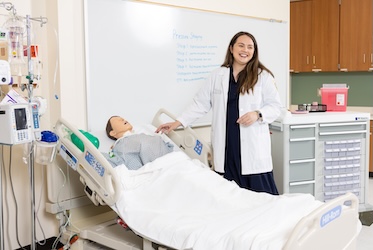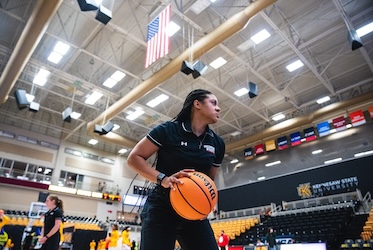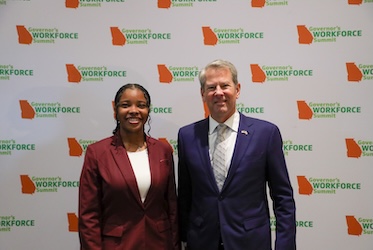

KENNESAW, Ga. | Jun 25, 2018
Work with youths opens minds to possibilities

Seven years ago, Tim Lubben, a health and physical education instructor, suffered a mysterious paralysis of his legs, the cause of which doctors still have not determined. Losing function in his legs and having to use a wheelchair, combined with the lack of a diagnosis, discouraged Lubben and shook his once-strong faith. However, he persisted and gradually regained his positive outlook, while remaining dedicated to teaching at Kennesaw State.
He now is applying that experience to help teenagers who are struggling with their own obstacles in life. Lubben is volunteering with teens detained in Georgia Department of Juvenile Justice facilities, teaching them sociological principles related to society and culture and their impact on behavior and identity. He hopes they can apply the lessons to become productive and law-abiding citizens.
“Things happen to some kids that make them say, ‘I’ve lost my faith.’ The same thing happened to me, and I worked through it,” Lubben said. “For me, there is a spiritual component to this. I feel like I’m called to help people and to communicate love.”
Lubben began the initiative during the fall 2017 semester, working with teens at the DJJ’s Regional Youth Detention Center in Marietta, and he volunteered at the RYDCs in Hampton and Rome during the spring 2018 semester. He visits the students on Saturdays for three consecutive weeks, teaching a different principle each time.
“Although Tim’s volunteerism with DJJ is only in its infancy, we are seeing success as the youths are attentive and engaged in his group,” said Christi Turner, a volunteer coordinator for the agency. “The youths are learning material that increases not only their knowledge, but also their self-esteem. They realize they can set future goals that they previously might not have thought of as being attainable.”
Lubben credited KSU Interim President Ken Harmon with supporting his idea while Harmon was serving as the University’s provost. Lubben then reached out to a friend, state Rep. Wes Cantrell of Woodstock, who serves on the Georgia House of Representatives’ Juvenile Justice Committee. He said Cantrell “loved the idea” and helped put it in motion with DJJ.
Lubben utilizes activities and games to involve the teenagers in the lessons. For example, he asks the students if they would rather have a $20 bill or a $5 bill – and, naturally, they all respond that they want the $20.
“So I hand out a Monopoly $20 bill to them. Then I put a real $5 bill there,” Lubben said. “I’m trying to get them to think, to make their own decisions and avoid groupthink – which is what landed some of them in the detention center. They became involved in criminal activity because ‘everyone else was doing it.’
“The idea is that people are trying to sell you stuff or communicate ideas to you all the time, and you have to think, ‘Do I really believe that?’” Lubben continued. “I use real-life examples, and they see how what I’m saying applies to their lives.”

His efforts are making a difference. One of the fall semester participants called Lubben’s course “amazing,” and another said it “opened my mind in many ways.”
“I felt like the course helped me look and think about the world differently,” one student said. “I would love to participate in more courses like this. They could help me prepare for other classes or just life in general.”
At the conclusion of his sessions with each group, Lubben presents a certificate to every student recognizing “exceptional participation in introduction to sociological theories.” The teens then can present the certificate to a judge to show they are serious about staying on the right path in life.
“They can take it to the judge at a hearing and say, ‘Look what I’m doing. I am trying to better myself so I can fit in the real world better,’” Lubben said. “When I was concluding with my first group, they were asking me, ‘When do I get my certificate? I want to take it to the judge.’ So that shows me that it’s important to them. They’re validating what they did.”
One reason Lubben feels so compelled to help the young offenders under the care of DJJ is that he understands the difficult upbringing many of them have had. Some have grown up in extreme poverty; others have parents who are addicted to drugs or are serving time in prison.
“Many of these kids have nothing,” Lubben said. “At 12, 14 years old, their first time (breaking the law) is stealing food because they have no food. What a way to start.”
That also gives Lubben a greater appreciation for his own family that has been with him through his challenges. He even gets to see them at times on the campus where he has taught since 2012, first in sociology and now as a part-time instructor of health promotion and physical education in the WellStar College of Health and Human Services.
All four of Lubben’s daughters have graduated from or currently are attending Kennesaw State. In fact, his two middle daughters – Kirsten, a sociology major, and Mackenzie, a public relations major – received their degrees on the same day. His youngest daughter, Savannah, is a senior studying human services, and his eldest daughter, Megan, is pursuing her master’s after having earned her exercise science degree from KSU.
“Kennesaw State is a great school,” Lubben said. “I love it.”
– Paul Floeckher
Photos by Lauren Kress
***
To read more of Kennesaw State University Magazine, click here.

Avid weightlifter leverages exercise science interest into impactful research

Nursing graduate returns to KSU for master's, teaching opportunities

Former SGA president thrives in player development role for Georgia State women's hoops

KSU nursing student shares perspective at Governor's Workforce Summit
A leader in innovative teaching and learning, Kennesaw State University offers undergraduate, graduate, and doctoral degrees to its more than 51,000 students. Kennesaw State is a member of the University System of Georgia with 11 academic colleges. The university's vibrant campus culture, diverse population, strong global ties, and entrepreneurial spirit draw students from throughout the country and the world. Kennesaw State is a Carnegie-designated doctoral research institution (R2), placing it among an elite group of only 8 percent of U.S. colleges and universities with an R1 or R2 status. For more information, visit kennesaw.edu.